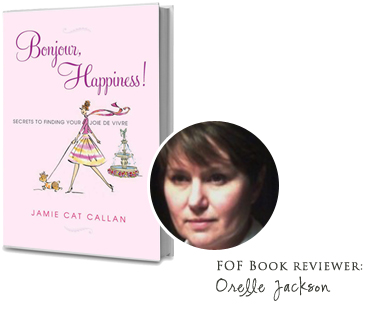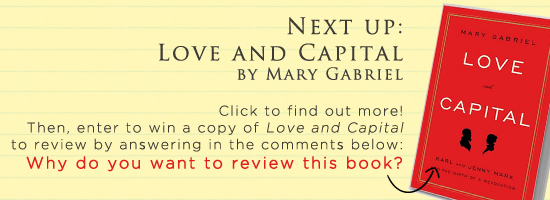Jamie Cat Callan grew up in Connecticut, though she claims, “I have French blood running through my veins.” As a little girl she observed her French grandmother– the way she dressed, the way she cooked, the way she loved. French women don’t worry about being skinny, young enough or accomplished enough, she observed.
In her most recent novel, Bonjour, Happiness! (Citadel Press, 2011) Callan studied the lives of French women to discover the recipe for true happiness, or ‘joie de vivre,’ and to share it will all her readers. “[It] translates the joie de vivre into a language of life that is not so foreign.” wrote a book critic for Kirkus Reviews. But, what did our FOF guru, Orelle Jackson think? Is there such thing as a recipe for happiness? And if so, did she find it in this book?
1. In a nutshell, what is the book about?
Happiness. Early in the book the author points to the subtle difference between the American “pursuit of happiness” and the French term “la recherché du bonheur” or “looking for happiness.” In this, she suggests we are chasing happiness. We see happiness as something elusive – down the street, around the corner, while the French are looking for happiness. It’s as if they already know it’s there, hiding in plain sight and if they stop they will find it – Voila! The author, who had a French grandmother, suggests French women may have the edge on the rest of us when it comes to happiness or joie de vivre. In part, this book is a guide to French style and taste and the French way of life, but it also is her own journey of discovery.
2. What is the genre of this book?
This book would fall into the self-help genre.
3. Did you enjoy it?
While this is a charming book, I didn’t love it. I liked parts of it, but I found it repetitive and the whole premise problematic. I found the process of her self-discovery tedious, exasperated by her infatuation with everything French and her belief that this was the path to happiness. I was relieved to get to the last part of the book when the author finally realizes that the secret to happiness is “finding those moments in your own ordinary life, finding the people and the simple pleasures of living that will bring you happiness.”
4. Was it a page turner, or did you have to push through it?
Although it was light reading, I found it difficult to stay focused because it did not hold my attention. This is the kind of book I wanted to merely skim through.
5. What would you want to ask the author, now that you’re done reading?
I was struck by the relationship she had with her mother and wondered if she got closer with her mom before she passed away.
6. Would you recommend this to other FOFs? Did you find yourself telling friends about the book as you were reading it?
I did tell friends about the book, but I would not give it a strong recommendation.
7. What part of the book did you like the most? What parts did you like least?
One of the most poignant parts of the book is when the author goes with her mother to get fitted for a bra after her radical mastectomy. In other parts of the book there seems to be an emotional gap between the mother and daughter. In this short but beautiful section, the complexity and the beauty of the mother-daughter relationship is revealed. The chapters “Good Enough to Eat” and “Weight Watchers in France” are also interesting. These two chapters really get to the big differences between us and our French sisters – our attitudes toward food and weight! While we use food as medication, punishment, or reward, our French counterparts use food as nourishment, celebration and occasion. On the opposite end of the spectrum I could not help but notice ambiguity. If happiness comes from loving yourself “for who you are right now – your beautiful, fragile, imperfect self” then why did it feel like most of the book implied if we were only French or behaved like French women or dressed like French women, we would be happy? In some ways I felt like this book should have been two books (or two essays) one about French living and style and one about Ms. Callon’s journey of self-discovery.
8. Is this book similar to any other books you have read? Which?
I have not recently read a similar book.
9. Any other thoughts you’d like to share?
There are beautiful, elegant and happy women in all parts of the world, and while their environment and ethnicity may play a role in their happiness, it is their ability to accept themselves and to see beauty in themselves and in the world around them that accounts for their happiness. While reading this book I was once again confronted by the fact that for most of our lives we measure ourselves against others and too often, find ourselves lacking. We torture ourselves with these perceived inadequacies. We punish ourselves because we are not enough – not smart enough, not thin enough, not rich enough, even not “French” enough. It is wonderful that as an FOF we begin to gain some perspective or enlightenment and realize we are “enough.” Let’s hope we can shorten this journey of enlightenment for the women and girls in our lives.
Also, while reading the book, I kept wondering just how happy French people are, so finally I did a very basic (non-scientific) internet search on depression levels in France. The results indicate France has a high rate of depression. The World Health Organization (WHO) report referred to in this article is complex and interesting.
—-
By entering this contest you are agreeing to read and submit a written review of this book to FabOverFifty and to send a photo of yourself to accompany the published story.
(Contest closes 11/17/2011. See all our past winners. See official rules. Our panel of editors will choose winners based on the quality of their written comments. We look for clear, concise writing; creativity; and thoughtfulness.)



